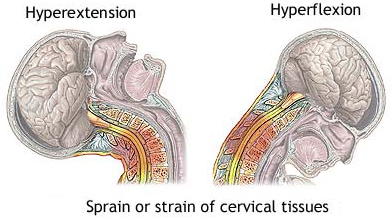MVA & WHIPLASH INJURIES
What is a whiplash injury?
- Whiplash injuries are also commonly known as cervical acceleration-deceleration (CAD) injuries.
- Most common causes of whiplash are from motor vehicle accidents (MVA), sports traumas, and falls.
- Injuries are usually more severe forms of sprain/strain of the neck.
- Sprain/strain occurs due to hyperflexion and hyperextension of the neck.
- Injuries include soft tissue damage (such as ligaments, tendons, muscles), joint damage, and in some cases neurological damage. In really severe cases ligamentous tears and fractures can occur as well. This can lead to instability of the neck.
What are the signs & symptoms of neck SPRAIN/STRAIN after whiplash?
- Neck pain
- Shoulder pain
- Deep referred pain into arms and hands
- Numbness/tingling/weakness into hands
- Decreased range of motion in neck/shoulders
- Headaches
- Low back pain
- Vertigo, dizziness, light-headedness
- Concussion
- Change in vision
- Change in hearing and sense of smell
- Tinnitis (ringing in ears)
- Pain with neck and shoulder movements
- Difficulty sleeping due to pain
- Disturbed memory
- Disturbed concentration
- Abnormal gait (loss of balance)
- Paraesthesia
What is cervical or neck instability following whiplash?
- In severe cases of whiplash (and other traumatic events), ligamentous tearing and fracture of the vertebral bones can occur. As a result, excessive and abnormal movements will occur around the joints in the neck. This is what is commonly referred to as INSTABILITY.
- One area of concern is severe injury to the articulations between C1 (atlas) and C2 (axis) vertebrae.
- Instability in this area is better known as atlanto-axial instability (AAI).
- AAI is a very serious condition due to the potential nerve and spinal cord damage causing progressive neurological manifestations.
- Neurological manifestations include:
-
- Abnormal gait
- Difficulty walking
- Severe neck pain
- Severe headaches
- Upper motor neuron signs (clonus, spasticity, hyperreflexia, Babinski sign)
- Torticollis (wry neck)
- Sensory deficits
- Neurogenic bladder
- Paraplegia (rare)
- Hemiplegia (rare)
- Quadriplegia (rare)
- Manipulation of upper cervical spine in cases of instability is contraindicated. In these cases, light and passive mobilization techniques are utilized.
- X-rays and MRIs are ordered if instability and neurological signs/symptoms are suspected.
- For fractures and severe instability, bracing and/or surgery might be required.
What are the treatments for whiplash injuries and neck sprain/strain?
- Treatments of the back and neck after an MVA or whiplash should start immediately.
- The sooner the treatments start, the more effective they are on the body as the body responds and heals faster. In addition, chronicity of the injuries can be reduced.
- Chiropractic therapy and more effectively co-therapy with physiotherapists, massage therapists, athletic therapists, acupuncturists, and personal trainers is proven to give the fastest and best results in patient recovery. Dr. Khoshroo works directly and closely with many therapists to provide the optimal treatments for the patients.
- Treatments by Dr. Soroush Khoshroo in North Vancouver for neck sprain/strain from whiplash following motor vehicle accidents (MVA) include:
-
- Cervical mobilization & chiropractic manipulation
- Active release technique (ART) for soft tissue damage
- Graston soft tissue technique
- Scar tissue breakup and tissue realignment
- Kinesio tape
- Neck exercises/stretches
- Cervical rehab
- Shoulder rehab
- Postural retraining
- Cryotherapy (ice therapy)
- Trigger point therapy
When should you get treatments for whiplash injuries and neck sprain/strain?
- Studies suggest that the earlier treatments are done the better the outcomes.
- DO NOT wait until symptoms become chronic. Get professional advice from a chiropractor, family physician, and other health care practitioners right away.
- Rest, in most cases, is not enough to completely alleviate the symptoms.
- It is very common for pain, stiffness, and other symptoms to start a few days and weeks after the MVA. This is because the body might be in shock for a few days/weeks. The brain has not had enough time to assess the extent of the damage.
- Treatments can start immediately for a few days after the car accident.
Where can you get chiropractic treatment for whiplash injuries and neck sprain/strain?
Dr. Khoshroo provides chiropractic treatments for whiplash injuries and neck sprain/strain from motor vehicle accidents (MVA) in North Vancouver at QubeCore Sports & Rehab.

